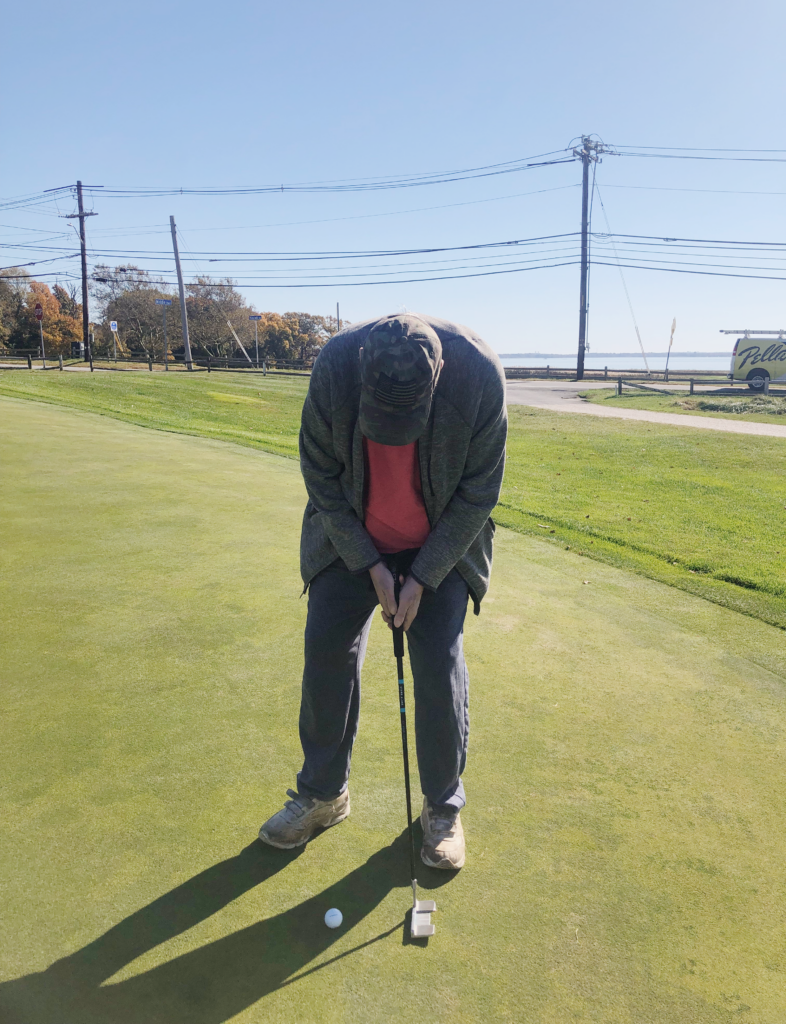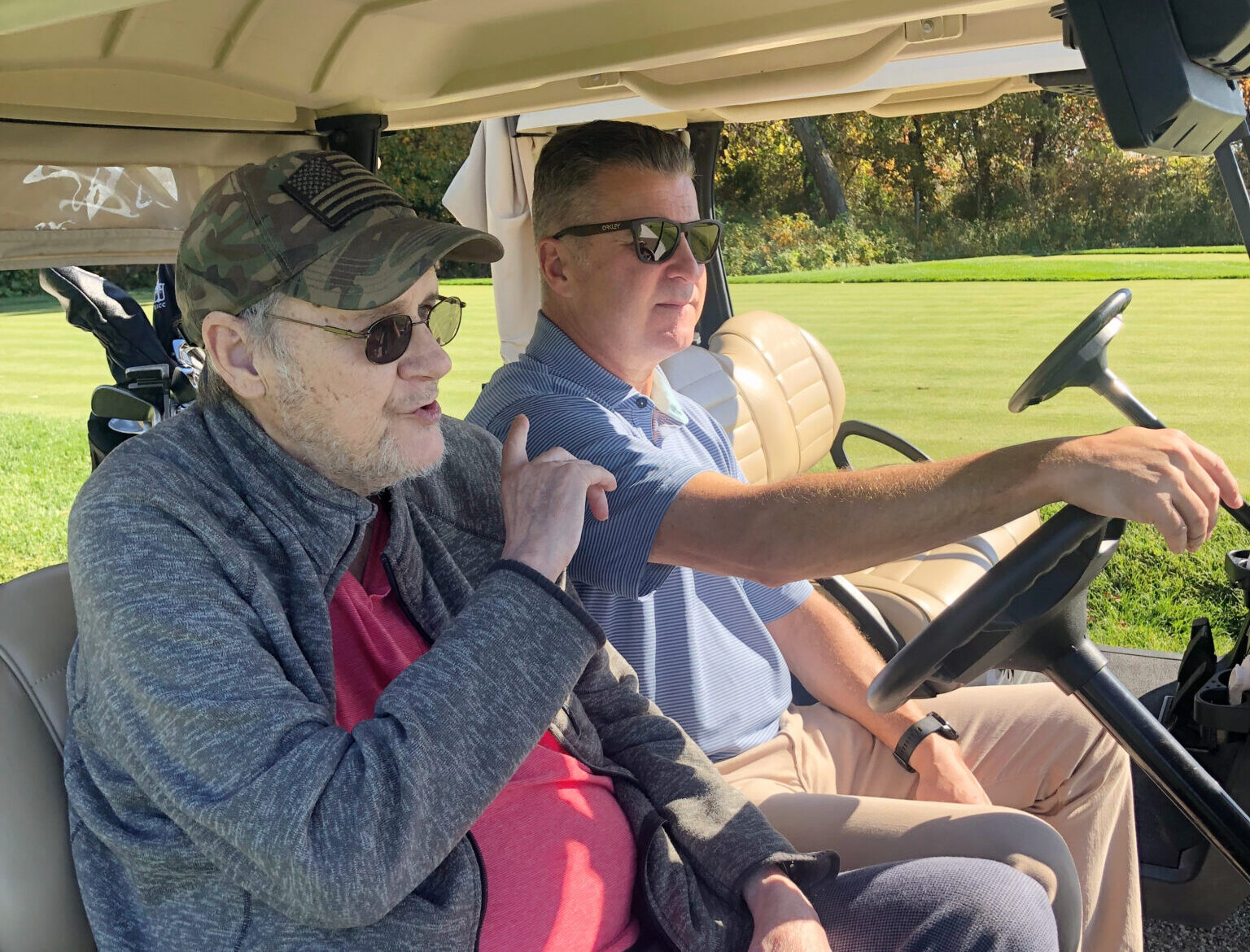In Jack’s 72 years, he’s made a lot of great memories with a golf club in hand — including on some of the world’s prettiest courses, from Florida to the Philippines.
But by the time he was diagnosed with stage 4 cancer and started hospice care, he assumed his golfing days were over.
Then HopeHealth hospice volunteer Claude Tetreault entered the picture. One warm fall day, out with Jack on their usual errands, Claude took a detour. He drove them right up to the entrance of Rhode Island Country Club, a local course Jack had admired since he was a kid.
“What’s going on here?” Jack asked.
“You told me you’ve never played this golf course before,” Claude replied. “This is your day.”
He was about to add another great golf memory to add to the list.
> Make a difference in someone’s life: Become a hospice volunteer
Hospice volunteers make every moment count
Hospice is about many things: comfort, dignity, quality of life. Above all, when time is short, it’s about getting the support you and your loved ones need to make every moment count.
At nonprofit hospice organizations like HopeHealth, volunteers are integral. They provide companionship to patients and respite care for caregivers. They share talents like reiki, music and art therapy. They take care of beloved pets, tutor school-age patients and plan honor ceremonies for veterans.
Jack and Claude, who were introduced last fall, are a particularly active example. Because Jack is still fairly mobile, Claude’s volunteer visits double as help with errands and transportation to doctor appointments. Without this help, Jack would no longer be able to do his own shopping or take himself out to breakfast — small acts of independence that take on deep meaning at the end of life. He makes it a point to introduce Claude to everyone, proudly adding, “he’s my hospice volunteer.”
By now, Claude recognizes Jack’s doctors and nurses at the VA Hospital, and he practically has Jack’s grocery list memorized. After errands, they always head to breakfast at Old Place 2, Jack’s favorite local diner.
As they followed their familiar route, Jack casually gestured out the passenger window, drawing Claude’s attention to the public golf course where he often enjoyed a round. Then, with sudden decisiveness, he instructed Claude to make a left turn. Roughly ten minutes later, they found themselves navigating the impressive perimeter of the Rhode Island Country Club.
With sweeping views of the Narranansett Bay, the course was lovely to look at. “A local gem,” thought Claude. He knew Jack missed golfing recently, and this would be the perfect spot to take him to.
Later that day, sitting at the diner with his plate of eggs, “I felt God tap me on the shoulder,” Claude says. He excused himself from the counter, where Jack was chatting up another customer, and locked himself in the restroom. Then he scrolled through his phone until he found the name that had suddenly come to him: Bob Bogan. He and Bob, a work acquaintance, once traded stories about how hospice helped Bob’s family. A few weeks earlier, wrapping up a meeting, Bob had been headed to Rhode Island Country Club to make his tee time.
Without giving himself a chance to change his mind, Claude made the call. Bob picked up. A few minutes later, they had a plan.
“Bob didn’t just say, ‘Sure,’” says Claude. “It was, ‘Absolutely, I’ll do anything to help. Let’s get him over there.”
> Checklist: What to look for in a hospice provider

From hospice to the fairway
The next week, after breakfast, Claude announced to Jack that they were going for a “mystery ride.” As Rhode Island Country Club came into view, Jack looked over him with amusement.
“Mystery ride? Don’t you know where the heck we are? We were here the other day!” Jack teased him.
Claude acted innocent. “Really?” he replied. “Well, that’s nice.”
Then they pulled into the club parking lot, where Bob was waiting in a golf cart, ready with a putter for Jack and an honorary Rhode Island Country Club sweatshirt.
“That’s Bob,” Claude told Jack, putting the car in park and cutting the engine. “He’s a member here. He’s offered to take you around, and, if you want, putt a little bit.”
Jack looked at Bob in the golf cart, then Claude, then out at the course.
“Jack’s not lost for words very often,” says Claude. “But he was definitely at a loss for words then.”
The three men spent the next hour driving the course, Bob describing its history and design — all the details Jack craved as an engineer and Rhode Island history buff. At one particularly scenic hole, they got out to putt. A breeze rippled the fall foliage. Sunshine glinted off Narragansett Bay.
“Jack soaked up all of it, just having the full experience,” says Claude. Despite his illness, he was out there having a great day on a beautiful golf course — and even, in this last chapter of life, living life to the fullest.
For Claude, it summed up why he became a hospice volunteer in the first place.
“All of us have our stories, our journey to get here, our purpose,” says Claude. “For me, when I put on that hospice badge, all the worldly stuff that we get caught up in melts away. Hospice volunteering is helping me be a little more humble, and a little more present in the moment. It’s taught me that dying is an important part of living. And it’s helped me see this stage of life as something that can be beautiful.”

